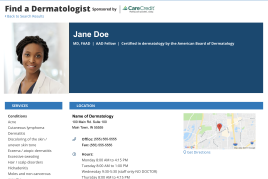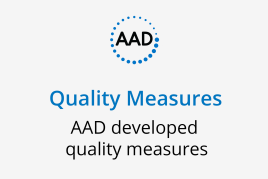Research underscores harmful and serious side effects associated with purchasing unregulated filler, neurotoxin products on e-commerce sites
ROSEMONT, Ill. (September 15, 2020) — You might do a lot of your shopping online, but there are some items dermatologists say you shouldn’t shop for virtually: cosmetic injectables, like fillers and neurotoxins. While fillers and neurotoxins, such a botulinum toxin, are safe when administered by board-certified physicians to create a more youthful skin appearance, dermatologists are becoming increasingly concerned that the internet is serving as a dangerous marketplace for “DIY” cosmetic treatments. A new article published online in the Journal of the American Academy of Dermatology reveals just how common these illicit products are on popular e-commerce sites, increasing the public’s risk for severe and potentially long-term complications, including blindness, disfiguration, and stroke.
“With non-surgical cosmetic treatments increasing in popularity, we’ve seen more patients in our practices who have experienced complications from procedures that have either been performed by unqualified individuals or involved illicit products,” says article author and board-certified dermatologist Brian Morrison, MD, MS, FAAD, assistant professor of dermatology at the University of Miami. “To help find out why this was happening, we started searching online forums and quickly realized there’s a growing trend of unregulated cosmetic injectables readily available for purchase by the general public.”
After performing searches for neurotoxins and fillers for sale at common online retail giants and marketplaces, researchers were able to easily purchase the items from both domestic and international vendors without needing to provide any medical license information, which is required by federal law.
“We were shocked to see these types of products available online for the public, as it puts consumers at risk for devastating side effects, like infection and blood clots that can cause permanent damage to your soft tissue and skin,” says lead article author Dr. Marina Li, MD, MS, dermatology resident at the University of Miami. “It’s extremely worrisome that patients are getting cosmetic treatments with unregulated, potentially harmful products from untrained individuals— or worse, attempting to self-inject these products at home.”
Filler and neurotoxin injections are some of the most popular anti-aging medical procedures available, and medical professionals inject millions of patients each year. Because the results depend largely on the skill and experience of the person performing the procedure, it’s important to have these procedures performed in a medical office by a licensed physician. Board-certified dermatologists have the education, experience, and training to safely and effectively inject fillers — which help restore fullness to the face — and neurotoxins — which relax wrinkles — into targeted areas to create a smoother, more youthful appearance without affecting other muscle groups. The effects last 3 to 4 months, and sometimes longer.
However, when purchased online from unlicensed, unregulated sources, fillers and other injectables may be misbranded, tampered with, counterfeit, and unsafe, says article author and dermatology resident at the University of Miami Dr. Fabrizio Galimberti, MD, PhD, putting patients’ health at risk and increasing the chances for serious complications.
“Some of the most common complications from unregulated cosmetic products include infection, scars, and swelling, while more severe cases can involve long-term paralysis, Bell’s palsy, blindness, and stroke,” says Dr. Galimberti. “The problem is two-fold: you’ve got products that can’t be trusted, and you’ve got people injecting them without adequate medical training and experience. To protect your health, you should never get injections in a non-medical setting, such as a party or someone’s home.”
The American Academy of Dermatology recommends consumers ask the following questions to ensure safety when considering cosmetic injectable procedures:
Who is going to perform the procedure? How many of these procedures has the physician performed? The procedure should be one that the doctor performs regularly.
What results can be expected? How long is the recuperation period? Are before-and-after photos of previous patients available? A dermatologist can tell you if the procedure will deliver the desired results, based on the condition of your skin as well as your age and health.
Are there any risks? Do the benefits of the cosmetic procedure outweigh the risks? Will the doctor be available if the patient experiences complications?
Where is the procedure being performed? The procedure should be performed in a medical center or doctor’s office, not a non-medical spa, shopping mall or private party.
Dr. Li adds that if in doubt, patients should ask to see the lot number and expiration date on the actual injectable product being used to rule out any counterfeit suspicions. “If the price seems too good to be true, it’s probably not reliable, as the product could either be diluted — which would increase the risk of contamination — or illicit,” she says.
Dermatologists encourage patients who experience poor outcomes from unregulated cosmetic injections to report any adverse events to the U.S. Food and Drug Administration.
“Getting a filler or neurotoxin is a medical procedure, and knowledge is power,” says Dr. Morrison. “Patients need to feel empowered to ensure that what is being injected into their skin is legitimate and purchased from a reliable source. A board-certified dermatologist who has been trained in the proper use of fillers and neurotoxins can help you get the results you want and avoid complications. And if you do experience any complications, a board-certified dermatologist has the expertise to help.”
To find a board-certified dermatologist in your area, visit aad.org/findaderm.
# # #
Contact
MediaRelations@aad.org
More information
About the AAD
Headquartered in Rosemont, Ill., the American Academy of Dermatology, founded in 1938, is the largest, most influential, and most representative of all dermatologic associations. With a membership of more than 20,000 physicians worldwide, the AAD is committed to: advancing the diagnosis and medical, surgical and cosmetic treatment of the skin, hair and nails; advocating high standards in clinical practice, education, and research in dermatology; and supporting and enhancing patient care for a lifetime of healthier skin, hair and nails. For more information, contact the AAD at (888) 462-DERM (3376) or aad.org. Follow the AAD on Facebook (American Academy of Dermatology), Twitter (@AADskin), Instagram (@AADskin1), or YouTube (AcademyofDermatology).
About JAAD
The Journal of the American Academy of Dermatology is the most widely read dermatology journal in the world, according to Kantar Media. JAAD was the second most-cited dermatology journal in 2017, according to Thomson Reuters’ impact factor report. Follow @JAADJournals on Facebook, Twitter and Instagram.
Editor’s note: The AAD does not promote or endorse any products or services. This content is intended as editorial content and should not be embedded with any paid, sponsored or advertorial content as it could be perceived as an AAD endorsement.
 Make it easy for patients to find you.
Make it easy for patients to find you.
 Meet the new AAD
Meet the new AAD
 2022 AAD VMX
2022 AAD VMX
 AAD Learning Center
AAD Learning Center
 Need coding help?
Need coding help?
 Reduce burdens
Reduce burdens
 Clinical guidelines
Clinical guidelines
 Why use AAD measures?
Why use AAD measures?
 Latest news
Latest news
 New insights
New insights
 Combat burnout
Combat burnout
 Joining or selling a practice?
Joining or selling a practice?
 Advocacy priorities
Advocacy priorities
 Promote the specialty
Promote the specialty
